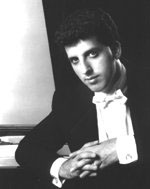 The career of pianist Jeffrey Biegel has been marked by bold, creative achievements and highlighted by a series of firsts. The career of pianist Jeffrey Biegel has been marked by bold, creative achievements and highlighted by a series of firsts.
He performed the first live internet recitals in New York and Amsterdam in 1997 and 1998, enabling him to be seen and heard by a global audience. In 1999, he assembled the largest consortium of orchestras (over 25), to celebrate the millennium with a new concerto composed for him by Ellen Taaffe Zwilich. The piece, entitled 'Millennium Fantasy for Piano and Orchestra', was premiered with the Cincinnati Symphony Orchestra. In 1997, he performed the World Premiere of the restored, original 1924 manuscript of George Gershwin's 'Rhapsody in Blue' with the Boston Pops. Charles Strouse composed a new work titled 'Concerto America' for Biegel, celebrating America and honoring the heroes and events of 9-11. Biegel premiered the piece with the Boston Pops in 2002. He transcribed the first edition of Balakirev's 'Islamey Fantasy' for piano and orchestra, which he premiered with the American Symphony Orchestra in 2001, and edited and recorded the first complete set of all '25 Preludes' by Cesar Cui.
Currently, he is assembling the first global consortium for the new 'Concerto no. 3 for Piano and Orchestra' being composed for him by Lowell Liebermann for 2005-06-07. The World Premiere will take place with the Milwaukee Symphony Orchestra, conducted by Andreas Delfs on May 12-14 2006, followed by the European Premiere with the Schleswig Holstein Symphony Orchestra, conducted by Gerard Oskamp, February 6-9, 2007.
Biegel is currently on the piano faculty at the Brooklyn Conservatory of Music at Brooklyn College, at the City University of New York (CUNY) and the Graduate Center of the City University of New York (CUNY).
|
|
|
|
|
|

Thursday, June 02, 2005
Fogel's Solid Assessment of the 21st Century Orchestra
Here's a solid assessment of today's orchestra situation by Henry Fogel--and my reply this morning to the respected President of the ASOL:
Dear Henry,
Bravo on your succinct assessment of the current symphony orchestra in our times as described in the Cincinnati Post. I agree that with 350 orchestras in the US and after 9-11, we're not doing so badly. However, in cultivating new audiences and selecting repertoire based on demographics and attracting new audiences based on this, I agree with you 150%. I am actually discussing this with composer Tania Leon, and how we can create a new piano and orchestra commissioning project based on a Latino subject that can be embraced by orchestras throughout the US to dig deep into the Latino and Hispanic heart of the communities that need to be tapped into.
Several years ago after I performed the world's first live audio/video recital on the internet, I wrote to the Melinda and Bill Gates Foundation to inquire if the foundation would support the beginning of live symphony orchestra concert series on the internet. Not limited to concert venue ticket sales, this would allow people from anywhere in the world to virtually 'attend' the concert of their choice, pay a nominal fee online (which would boost the budgets for the orchestras) and put them in touch with what is happening musically anywhere in the world that is hooked up to an online system. Since this was a new approach and the union issues would have to be sorted, my idea to the Gates Foundation was to create first step regional orchestras throughout the world in strategic locations, comprised of players graduating from conservatories and those waiting for prospective jobs. They would receive salary, benefits etc, and the concerts would be cybercast. I called it the MSNBC CyberPhilharmonic (a 21st century version of the NBC Radio Symphony of the 20th century). This would have sparked renewed interest in 'concert going' which could have expanded into more regional symphony orchestra cybercasting for their subscription series. Of course, it was refused. I had shared this idea with some friends who said I was ahead of my time with these wild ideas. I do envision this before the end of the century.
I look forward to meeting you in Milwaukee next May for the Lowell Liebermann Third Piano Concerto project. I wish you great success in helping our orchestras as they enter new times, and hope they will adapt your solid principles and ideas that can help them rise through the 21st century.
Best regards,
Jeffrey
posted by Jeffrey Biegel
6:45 AM
| |
|



